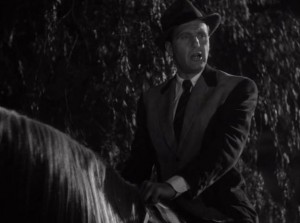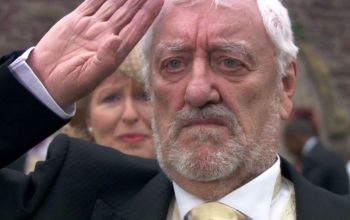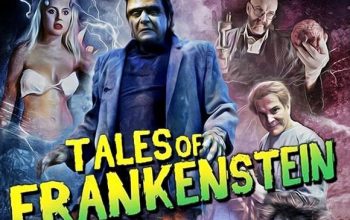Ghost of Frankenstein – 1942
“A flash of lightning illuminated the object, and discovered its shape plainly to me; its gigantic stature, and the deformity of its aspect more hideous than belongs to humanity, instantly informed me that it was the wretch, the filthy daemon, to whom I had given life.” — Mary Shelley, Frankenstein
“Your father was Frankenstein, but your mother was the lightning!” – Ygor, Ghost of Frankenstein.
Ghost of Frankenstein is where the Universal Frankenstein series really starts to run out of ideas. It’s basically a ‘greatest hits’ compilation rather than a movie in its own right. It starts right out with the angry peasants and goes straight into the destruction of the castle, and then just meanders its way through Frankensteinian tropes.
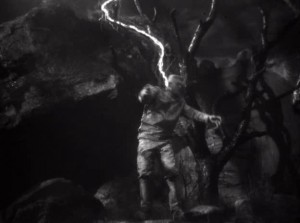
It does bring two innovations to the Frankenstein story. First, it brings up the idea that the Monster is indestructible. Second, it introduces the trope of the Monster being frozen in something and needing to be revived (this time it’s sulphur, but later it becomes quicksand or ice).
The villagers of the town of Frankenstein are angry because their town is cursed. Solution: blow up Castle Frankenstein. As usual, the peasants gather up their torches, but this time they also bring dynamite — so some sort of technical progress for the ignorant villagers.
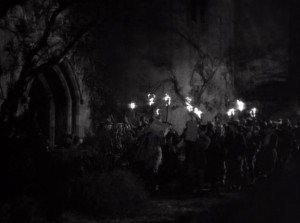
The exact relationship between the castle and the lab has changed a lot over the course of the movies, but now they are one and the same. The place is defended by Ygor (Bela Lugosi), who did not die when Wolf Frankenstein shot him in Son of Frankenstein. No reason is given, beyond that Ygor is ‘hard to kill.’ As the castle collapses, Ygor flees into the cellars, where he discovers that the sulphur pit that Wolf kicked the Monster into has dried up. The Monster (Lon Chaney, Jr) is freed from the hard sulphur prison by the explosions, and the friends flee the castle. In the best scene in the movie, the weakened Monster walks into a lightning storm, and is struck by a bolt. It is now feeling better, in spite of being played by Lon Chaney, Jr. Ygor says that they’ll go to see Henry Frankenstein’s second son to ask for help.
Ludwig Frankenstein (Sir Cedwick Hardwicke) is a benevolent doctor who has pioneered removing the brain from the human skull so that it can be operated on then returned to its rightful place. In making this happen, he has succeeded where his mentor Dr Bohmer (Lionel Atwill) failed. That probably won’t come up again, will it? Oh, wait, it does. Bohmer is jealous of his pupil’s success.
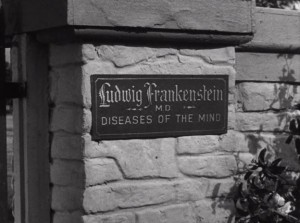
Ygor and the Monster arrive in the town of Viseria, which is the setting for much of the rest of the Universal Monster series. While Ygor asks for directions, the Monster wanders off. He comes across a little girl who is being bullied, and scares the bullies off. The little girl asks it to retrieve the ball that the the bullies have kicked onto a roof. He complies, but the villagers see him carrying the little girl on the roof and understandably panic. The Monster knocks down some angry villagers, then gets the ball. He’s talked down from the roof peacefully, but then set upon by the police and subdued.
Then a bland romance subplot commences. Sigh. The town prosecutor, Erik (Ralph Bellamy) visits Elsa Frankenstein (Evelyn Ankers), Ludwig’s daughter. She takes him to see her father, asking him to advise on the ‘madman’ in the prison. Ygor visits Ludwig too, explaining that the prisoner is the Monster. He demands that Ludwig restore the Monster’s health. Ludwig doesn’t like this idea, and seeks to distance himself from his family curse. Ygor threatens to tell the locals that Ludwig is the son of Henry Frankenstein. Ludwig caves, and consults the notes of both his father and brother.
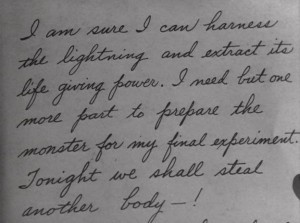
The Monster is put on trial, but can’t speak to defend himself. The little girl tries to get him to talk, but nothing comes of it. Dr Frankenstein examines the Monster, who seems to recognise him. When Ludwig denies any knowledge of the creature, it breaks its chains and runs amok, only to be lulled back into calm by Ludwig’s horn playing. They escape on a cart, pursued by a mob. That’s three angry mob scenes so far, and the movie’s not even half over.
Elsa discovers the Frankenstein notes in her father’s office. There’s a little flashback to the 1931’s Frankenstein, which pads out the movie a couple of minutes but otherwise serves only to make this one look worse by comparison. It’s hard not to laugh out loud when they cut from Colin Clive to the unwrapping scene with Chaney filling in for Karloff. As Elsa sits — horrified by the relatively poor production values of her own film — the Monster and Ygor appear in the window behind her. The Monster smashes open the door and kills Ludwig’s assistant and captures Elsa. Ludwig turns on the knockout gas tap (as all good hospitals had in the 1940s) and the Monster is brought down. Bohmer helps Frankenstein tidy up, and discovers the Monster.
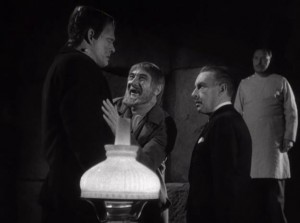
Frankenstein sets out to discover how the Monster can be disabled or destroyed. He decides the only way to destroy it is to take it apart piece by piece. Dr Bohmer claims this is murder, and declines to help. Henry Frankenstein’s ghost appears to argue with Ludwig, and also justify the film’s title. The ghost suggests that the Monster could be cured of its evil by replacing its brain.
This is where it gets weird. Frankenstein tells Ygor to tell the Monster that it’s getting a new brain. We’re moving away from the idea of the brain as the seat of selfhood as seen in Frankenstein and in some new direction where the brain is basically a conscience. The Monster will still be himself, just not evil, once it has the brain of the dead assistant.
Ygor argues against the choice of brain, arguing that his brain should be put in the body. “You can make us one,” Ygor says. “My brain and his body. Together.” Ludwig turns him down, and does some mad science stuff with the equipment he happened to have lying around. There’s some dull argument between Frankenstein and Elsa.
Basically, we’re headed for the denoument in twenty minutes, and we’re killing time until then. The Monster is actually happy to be getting a new brain. Ygor starts working on Bohmer’s ego, manipulating him into changing his plans. Erik and the cops show up, looking for the Monster. Their search is made easier by the fact that Frankenstein’s hospital seems not to have any patients. Erik discovers the secret underground dungeon in the benevolent doctor’s hospital.
It’s almost like Frankensteins are waiting to turn evil.
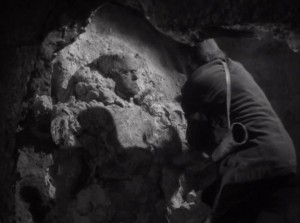
The Monster goes off and finds the little girl from earlier, but is summoned by Ygor’s horn. He carries the girl off, by implication because he wants her to be the brain donor. As he goes, he knocks over a lamp and sets the house on fire. Ygor tries to talk the Monster into taking his brain instead, but the Monster crushes him half to death. There’s some pointless conflict, before Elsa is sent off with the girl. The Monster is prepped for operation. Bohmer harvests Ygor’s brain, which is placed in the Monster. This takes an interminably long time.
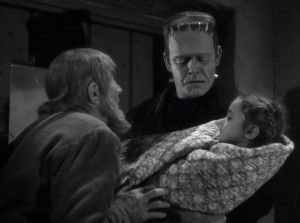
Two weeks later, yet another angry mob is formed. They decide Dr Frankenstein must be harbouring the Monster and attack the hospital. Erik comes along on horseback and tries to stop the mob. Ralph Bellamy on horseback trying to talk down an angry mob is… well, actually it’s kind of cool. When I build my time machine, I’ll start pitching my ‘Ralph Bellamy: One Man Riot Negotiator’ series to Jack Warner.
“Nothing’s to be gained by hasty action,” Erik says. This could easily be the tagline of the movie.
Frankenstein tells Erik that the he has healed the Monster by putting the lab assistant’s brain in it, thereby restoring the good name of Frankenstein. The rioters, with no Bellamy to talk sense into them, attack the hospital. Frankenstein talks to the Monster, who responds with Ygor’s voice. Erik escapes, Dr Bohmer tries to turn on the sleeping gas. The rioters begin choking. The little girl and Elsa are saved, the rioters run off, coughing. Erik tries to save Ludwig, but Elsa faints so he has to rescue her instead. Ygor/The Monster goes blind, because he had the wrong blood type and that’s just how brain transplants work, dammit. Furious, the Ygor/Monster kills Bohmer, then staggers around the lab smashing stuff. The hospital burns, Ygor trapped inside. Eric and Elsa walk off into the sunrise. The end.
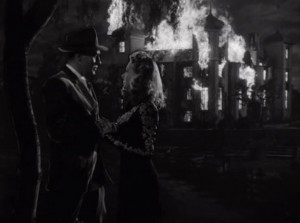
Ghost marks the point where Frankenstein passes from being an A-film to a B-film property. It’s also the last film in which Universal has the confidence in the Monster holding as a solo lead in his own movie. The absence of Boris Karloff is tangible in every scene the Monster is in. Lon Chaney Jr, fresh from his success as the Wolf Man is not awful as the Monster. He’s physically bigger than Karloff, which adds to the Monster’s imposing presence, but otherwise Lon brings little new or interesting to the role. He does lip-synch to Ygor’s dialogue pretty well, though.
There are some good actors doing their best with the material they have to work with. The cinematography isn’t at the heights it reached in Bride, butstill pretty good. On the other hand the direction is very bland and the whole thing seems more stagey than it really needs to be. The tension of the earlier films is not there, nor the humanity. It lacks any sort of point, just sort of going through the motions. Brains, mobs, Ygor, yadda yadda.
I’d kind of like to say more about it, but there isn’t much to say. Ghost is probably the most forgettable of the Universal Frankensteins, In spite of that, it has three interesting points: one — the Monster is immortal and indestructible. Two, the Monster can be frozen somehow and revived when required. And three, one riot, one Ralph Bellamy.
